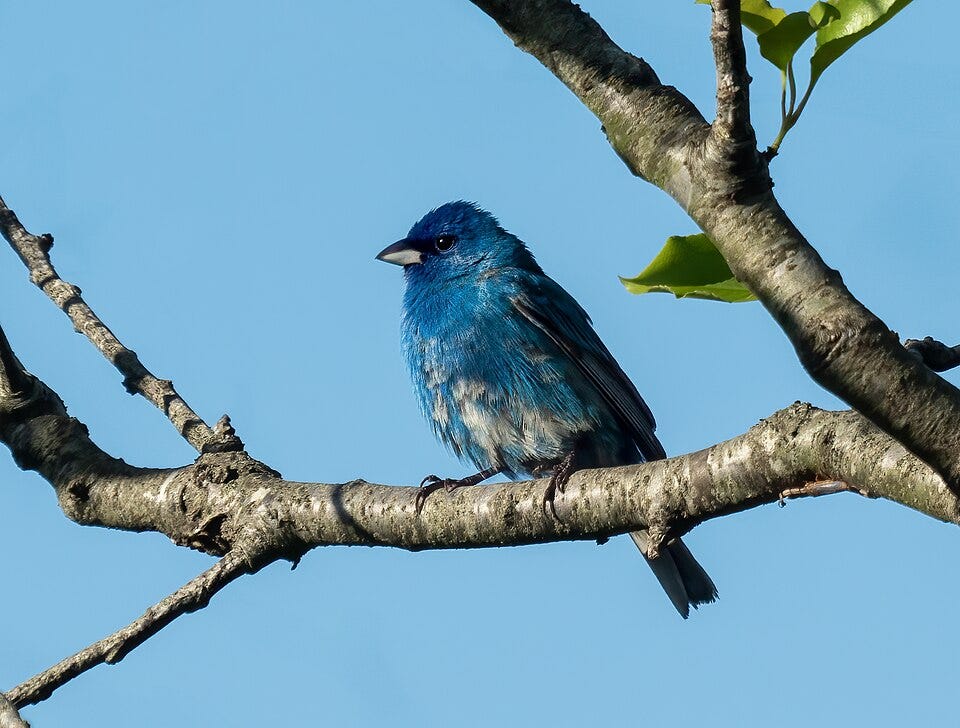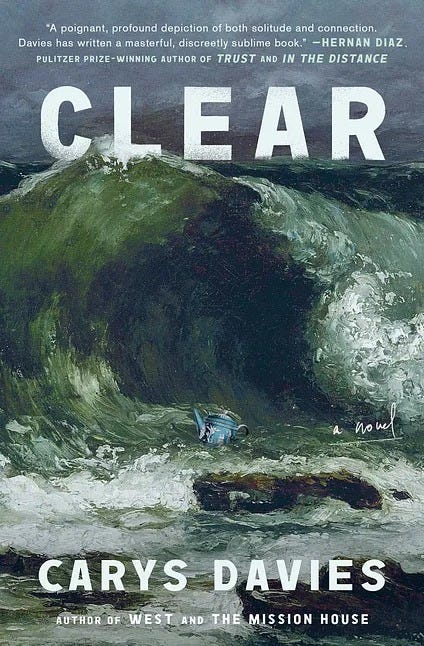After one day of heat this week, the weather reverted to blue skies, wind, and temperatures barely reaching a high of 20C (68F) - beautiful weather, in my opinion, good for walking and gardening and just generally being outdoors.
High in a half-dead poplar on the north side of the Arboretum, an indigo bunting sang, the evening I walked there. Alongside the gravel track, the wildflowers of agricultural land bloomed: white ox-eye daisies, purple vetch, yellow bird’s-foot trefoil. White clover, purple clover, yellow bee clover. Red-winged blackbirds chirred near the small marsh; song sparrows sang ‘Pres-pres-pres-presbyterian’ from swaying stems of grass. A rabbit hopped off the path. Bees buzzed in the clover, and overhead a red-winged hawk circled.

Time blurred; sixty years disappeared. I was a child again, exploring the farm lanes behind our house, learning the names of these same flowers in the same evening warmth; hearing the same birds, the same gravel and sand beneath my sandals. No madeleine for me; it is always the experience of the natural world that brings these involuntary memories, so strong they fold time.
I’ve reached the end of part II of An Unwise Prince; part III is semi-outlined (as much as I ever outline anything, knowing the characters (or my subconscious, however you prefer to word this) will likely derail my plans anyhow. As happened this week, when the role of a minor character suddenly became a bit larger. I’ve been playing a bit with cover concepts, too: they’re not quite ready to be shown, but perhaps next week. The sequel, A Distant Obligation, is beginning to move from amorphous concept to glimpses of scenes and plot, too. There are some knotty plot logistics to work out, but they will come. After (almost) nine books, and this tenth emerging, I trust the process. It will happen.
Finally I’m finding time to read fiction! This week’s book (I’m not promising one a week) is Carys Davies’ Clear. I was predisposed to like this book, because it and my own books share a theme (a sub-theme, in my case): the importance and limitations of language, its subtleties and precision, how it can be tied to place and culture and identity, and how affects understanding, whether between individuals or nations.
I tried to sort out the inchoate ideas forming in my mind. About language, and meaning, and if all concepts were universal, and could be translated. About the gap between intent and comprehension, between what was meant and what was understood, and the assumptions and shared experience encompassed—or not—in any exchange.
- from Empire’s Exile
Set on a remote Scottish island during the Clearances, told from the points of view of Ivar, the last man living there, John, the minister sent to evict him, and Mary, the minister’s wife, Clear is a haunting story about landscape and language, belonging and love, forgiveness and acceptance. The title is brilliant, referring not just to the act of clearance, but to the clarity that evolves and emerges for all three characters. That Davies’ island character, Ivar, speaks Norn, the now-extinct Norse-Gaelic language of the northernmost Scottish islands, with its precise, finely-defined words for weather and sea and landscape adds a poignancy for the reader: it is not only the end of way of life we are witnessing, but the end of a language that evolved from centuries of living in an environment.
The island setting matters: in Lawrence Durrell’s words, islands are “…places where different destinies can meet and intersect in the full isolation of time” and that is what happens here for Ivar and John and eventually Mary. Ivar’s island is a place that supports only the bare necessities of physical life, surrounded by a tidal sea that both takes and gives. John’s purpose on the island is to strip Ivar of his life here, to clear the land for sheep. The historical facts are laid out almost unemotionally: this happened; this is how it affected three people caught in the moment. Clear is a personal story set against a historical background, not an overt political statement.
Davies’ own language in the book, her prose, is spare and simple and beautiful; it fits the setting and the characters. Clear won the Royal Society of Literature’s 2025 Ondaatje Prize for writing that best evokes the spirit of a place; a well-deserved accolade.
The song that came to mind while reading Clear was Garnet Rogers’ Next Turn of the Wheel - while it’s not an exact fit, some of the feeling is the same.
Find (almost) all my books at https://scarletferret.com/authors/marian-l-thorpe






